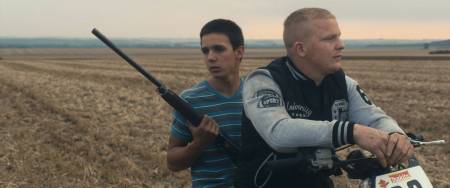-
Jean-Charles Hue: EAT YOUR BONES (2014)
JEAN CHARLES HUE: EAT YOUR BONES/MANGE TES MORTS (2014)

JASON FRANÇOIS AND MOISE DORKEL IN EAT YOUR BONES
Tragicomic Gypsy noir thriller, enacted by themselves
Following up on his documentary/fiction hybrid debut, The Lord’s Ride/La BM du Seigneur, which portrayed the gypsy communities of northern France, director Jean-Charles Hue reunites some of that film’s nonprofessional acors to tell the story of another Romani family, by reports closely related to their own lives. It's the day before the eighteen-year-old Jason (Jason François) is to be baptized, and some in the tribe, including his mother, are ardent born-again Christians. But the day takes a huge detour. Jason's half-brother Fred (Frédéric Dorkel) arrives, just released after 15 years in prison for killing a cop. Riding in Fred's lovingly preserved BMW, the two, along with a third brother and a cousin, team up to steal a truckload of copper, but things go dramatically wrong in what turns out to be very much a short gangster film, only with more of a do-it-yourself flavor, actors from the milieu of the story recreating real events of Fred's life. Though the film image quality was disappointing, eventually in the night scenes the images turn out to be poetic and beautiful. No wonder Hue, who received a number of nominations for his first film, was awarded the 2014 Prix Jean Vigo, a prize reserved for a French director whose work shows a "spirit of independence and extraordinary style." A remarkable piece, something of a curiosity, a movie that enables real people who live partly cinematic lives to comment on those lives through enacting fiction. At the same time it's clearly filmmaker Jean-Charles Hue's homage to a people and a world whose romantic and heroically doomed existence he sees beyond their trailer-trash Harmony Korine facade.
Reviewing the film at Cannes for Hollywood Reporter, Jordan Meltzer observes the cast, whom he calls "the slang-spouting trailer park gypsies of Northern France," partly through an American lens, noting that their "love of beer, barbecue, crime and God are about the closest thing Europe may have to the gun crazy communities of America's Deep South." He also notes their similarity to the characters of Bruno Dumont's The Life of Jesus. Meltzer is also right in noting the film "meanders too much" in its documentary-style prelude by the trailers and the barbecue, and only really hits its stride when Fred roars off in his car with his compadres and night falls. This is when dp Jonathan Ricquebourg shows both his aesthetic and action chops, for shootouts and car chase that as Meltzer puts it have "the fury and energy of the early Mad Max movies." It goes without sayint ghat these gypsies and the Dorkel family in particular, whose partly Eastern European origins explain why some of them are blond, are natural thespian types, having no trouble at all ramping up their everyday behavior into something that fits a combination gangster and Western plot.
Eat Your Bones/Mange tes morts-Tu ne diras point, 94 mins., debuted at Cannes Director's Fortnight. French theatrical release 17 September 2014 led to excellent reviews (AlloCiné press rating 4.0). Here this niche film even in its native France is more of a curiosity, and it is currently marred by very odd English subtitles in which certain consonants are consistently missing. Screened for this review as part of the March 2015 Film Society of Lincoln Center/UniFrance joint series Rendez-Vous with French Cinema.
Last edited by Chris Knipp; 03-10-2015 at 08:00 AM.
 Posting Permissions
Posting Permissions
- You may not post new threads
- You may not post replies
- You may not post attachments
- You may not edit your posts
-
Forum Rules





 Reply With Quote
Reply With Quote
Bookmarks